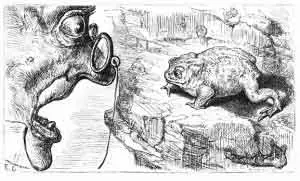An ancient Toad bragged about his background. A May-fly, born that morning, related how his life meant far more than the life of the old Toad. He was right.
Size and age don’t indicate importance.

JBR Collection
As some workmen were digging marble in a mountain, they came upon a Toad of enormous size in the midst of a solid rock. They were very much surprised at so uncommon an appearance, and the more they considered the circumstances of it, the more their wonder increased. It was hard to conceive by what means this creature had preserved life and received nourishment in so narrow a prison, and still more difficult to account for his birth and existence in a place so totally inaccessible to all his species. They could come to no other conclusion but that he was formed together with the rock in which he had been bred, and was coeval with the mountain itself. While they were pursuing these speculations, the Toad sat swelling and bloating, till he was ready to burst with pride and self-importance, to which at last he thus gave vent: “Yes,” said he, “you behold in me a specimen of the antediluvian race of animals. I was begotten before the Flood; and who is there among the present upstart race of mortals that shall dare to contend with me in nobility of birth or dignity of character?” A May-fly, sprung that morning from the river, as he was flying about from place to place, chanced to be present, and observed all that passed with great attention and curiosity. “Vain boaster,” said he, “what foundation hast thou for pride, either in thy descent, merely because it is ancient, or thy life, because it has been long? What good qualities hast thou received from thy ancestors? Insignificant even to thyself, as well as useless to others, thou art almost as insensible as the block in which thou wast bred. Even I, that had my birth only from the scum of the neighbouring river, at the rising of this day’s sun, and who shall die at its setting, have more reason to applaud my condition than thou hast to be proud of thine. I have enjoyed the warmth of the sun, the light of day, and the purity of the air: I have flown from stream to stream, from tree to tree, and from the plain to the mountain. I have provided for posterity, and I shall leave behind me a numerous offspring to people the next age of to-morrow; in short, I have fulfilled all the ends of my being, and I have been happy. My whole life, ’tis true, is but of twelve hours, but even one hour of it is to be preferred to a thousand years of mere existence which have been spent, like thine, ignorance, sloth, and stupidity.”

Jefferys Taylor
WHEN Cadmus liv’d in days of yore,
Three thousand years ago or more:—
Retired within a shady grot,
There lived a toad—deny it not,
Who, thoughtful, sleepy, or sedate,
Pass’d years away in lonely state.
At last he slept, as it should seem,
Beside a petrifying stream,
Which ere he woke to find it out,
With stone enclosed him, round about;
So tightly fitted to his shape,
He could not stretch, nor even gape.
—O! had he known, ere his repose,
How many years he had to doze,
No doubt he would have settled all
His wordly matters, great and small;
Nor left his children fighting battles
About his sundry goods and chattels;
Who knew not (pardon this digression)
Whether they ought to take possession.
Three thousand years had he to pass,
Imbedded in the solid mass;
(I hope this messuage [sic] of stone,
Was rent free all this time, I own.)
However, not a year ago,
It seems this block was sawn in two;
When, to the workmen’s great surprise,
The drowsy reptile met their eyes,
Who issued, from his durance freed,
A venerable toad indeed.
Then crowds drew near from far to see
This remnant of antiquity,
Who fully conscious of the fact,
Their utmost homage did exact.
It happen’d then, there came that way
A fly that only lives a day;
Who thinking it was rather odd,
Such reverence should be paid a toad,
First ask’d the reason of the fuss,
And then address’d the reptile thus:
“And so,” said he, “I find its true,
This world’s but twice as old as you;
A poor ephemeron am I,
This day was born, this day must die;
Yet I maintain, say what you will,
My life has been the longest still.”
“What,” said the toad, with angry his;
“D’ye mean by such a speech as this?”
“Sir,” said the fly, with ready breath,
“Sleep is another kind of death;
Your days, though more than I can number,
You’ve spent in one continued slumber;
My life, though short it is, I own,
Has never once a slumber known:—
I do not reckon in the term
While I remain’d a torpid worm;
Nor you the time you must have dozed
Ere stone around you could have closed:
Nor when one’s half asleep you see,
Which you at present seem to be;
But when one’s broad awake, you know,
And doing what one has to do,
As has this very day been done
By me, a poor ephemeron;
Which single day, it hence appears,
Exceeds your long three thousand years.”
I’d further add, the sense to fix,
Lie not till nine, but rise at six;
The longer you can keep awake,
The longer you your life will make.

